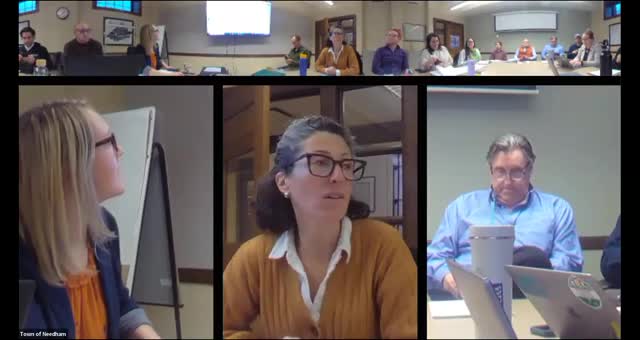Needham tree committee launches community plan work, schedules public listening session for June 4
Get AI-powered insights, summaries, and transcripts
Subscribe
Summary
The Tree Preservation Planning Committee of the Town of Needham on April 16 opened its work on a community tree plan, heard a presentation from the town arborist and staff about inventories and planting programs, and scheduled a public listening session for June 4 to gather resident feedback.
The Tree Preservation Planning Committee of the Town of Needham on April 16 opened its work on a community tree plan, heard a 20‑minute presentation from the town arborist and staff about inventories and planting programs, and scheduled a public listening session for June 4 to gather resident feedback.
Committee members said the work matters because Needham is losing canopy in places to construction and disease and the town lacks a comprehensive program to steer private‑property tree removals, coordinate mitigation planting, and secure funding. Staff and members described ongoing inventory work, annual "windshield" surveys of public trees, setbacks planting for homeowners, and a town meeting article seeking funds for tree management.
Town arborist Eddie (town arborist) told the committee why a formal plan matters: "Right now, we are under chapter 87," he said, referring to Massachusetts law on public shade trees, and then outlined why local planning is needed to maintain species diversity, reduce risk and guide planting. He described current practice: an annual visual inventory of public street trees (a "windshield survey"), use of certified arborists for inspections and prioritizing hazardous removals, and a nursery program that grows bare‑root trees for later planting. Eddie said the department plans more than 70 plantings in coming weeks and urged homeowners to hire certified arborists for private‑property concerns.
Staffer Katie (planning staff) summarized early background work and a peer community memo prepared by interns: "On page 2, Arlington, Cambridge, Lexington, Wellesley are the communities that have private property regulations related to trees," she said, and asked the committee whether it wanted focused follow‑up with those towns. Members agreed to begin by inviting Wellesley (cited as a working example) and Newton to brief the committee about what has worked and what has not, then broaden outreach as needed.
Committee discussion focused on three near‑term priorities. First, improving public communication around removals — including site signage or QR links to explain why a tree came down and replanting plans — to reduce surprise and frustration. Fred (committee member) urged the group to quantify benefits in dollars: "I think it would be really great if we could kind of monetize all of these activities that you do," he said, recommending cost/benefit figures that could be helpful for budget and town meeting votes. Second, members urged better coordination with other town processes — large house reviews, planning, stormwater and conservation — to avoid conflicting rules and to ensure any bylaw or regulation is administrable. Third, the committee discussed potential funding options and incentives, including a tree replacement revolving account and the town meeting article that staff said would ask for about $225,000 for the tree management program; staff noted Community Preservation Act (CPA) funds were considered but a recent request had been judged ineligible.
Members and staff also discussed enforcement and workload tradeoffs if the town pursues private‑property tree regulation. Several speakers warned that a bylaw can create administrative burden and that some towns with bylaws lack the staff to enforce them; others said incentives and integration into existing permit processes could reduce additional workload. Kurt (contractor/member) described the building process and noted builders typically control site work early in projects, so members said outreach and rules aimed at builders (not only homeowners) will matter.
The committee agreed on immediate next steps: invite representatives from Wellesley and Newton to speak at a future meeting; prepare a short, table‑guided public listening session on June 4 (with an option for a microphone/open‑mic portion and a follow‑up town survey); and develop a template of questions to use when researching peer towns and when compiling resident feedback. Staff said existing materials — a prior 2016–17 draft bylaw and the interns' peer memo — would be circulated to members as a starting point.
Votes at a glance: the committee approved the minutes of its March 6 meeting by voice vote. The motion to approve the minutes was moved and seconded (mover/second not recorded in the transcript) and the chair called for and received an "Aye." No other formal votes or bylaws were adopted at this meeting.
The committee did not take final action on a tree bylaw or funding request at this session; members repeatedly stressed that the group is at the early, information‑gathering stage and invited public input at the June 4 listening session. Staff said some implementation steps (inventory updates, planting events for Arbor Day, and coordination with utilities) will continue regardless of future bylaw outcomes.
